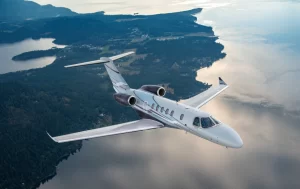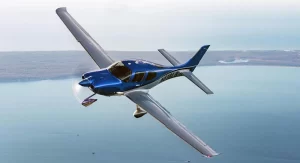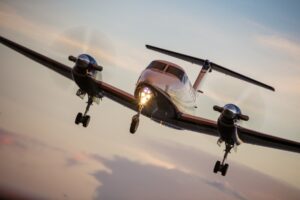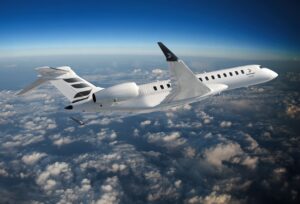History and Development
The Falcon 2000, a masterpiece from Dassault Aviation, had its maiden flight in 1993 and has since become a benchmark in the executive jet market. Derived from the renowned Falcon 900, the Falcon 2000 combines performance, efficiency, and comfort, making it a top choice among executives and corporations worldwide.
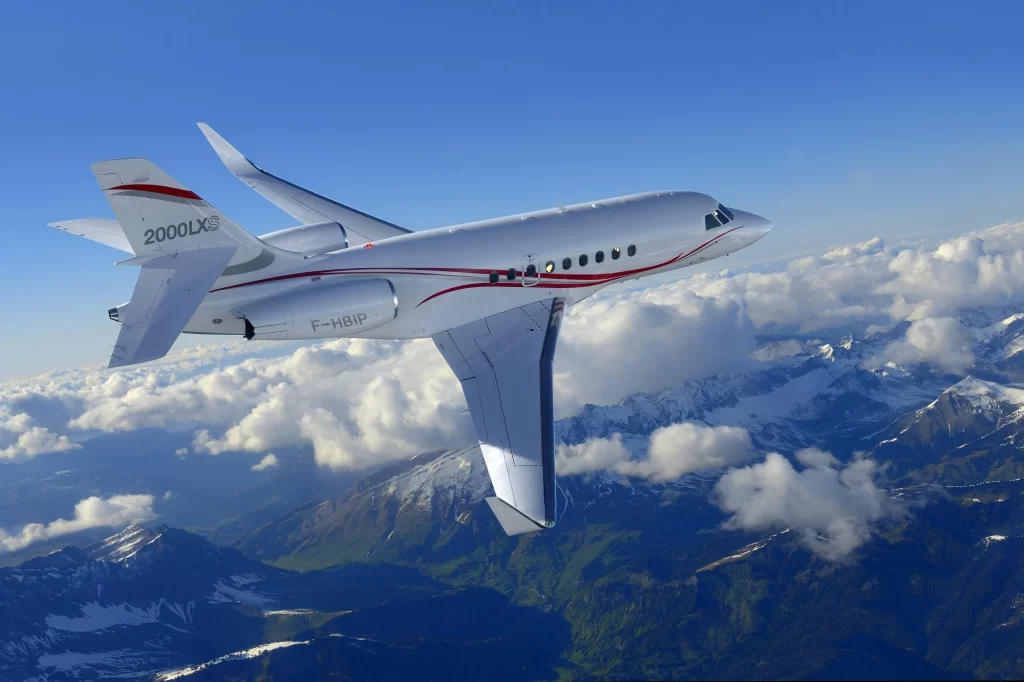
Model Variations
The Falcon 2000 family has evolved over the years, with several variants offering different capabilities and features:
- Falcon 2000: The original model, introduced in 1993, featuring a balanced mix of range and performance.
- Falcon 2000EX: An enhanced version with increased range and upgraded avionics, introduced in 2003. This variant includes more powerful engines and additional fuel capacity.
- Falcon 2000LX: Featuring winglets for improved fuel efficiency and range, this variant was introduced in 2009, providing an increased range of up to 4,000 nautical miles.
- Falcon 2000S: Launched in 2011, this model offers improved short-field performance, making it suitable for shorter runways while maintaining a range of 3,350 nautical miles.
- Falcon 2000LXS: An advanced version combining the short-field capability of the Falcon 2000S with the range and performance of the 2000LX, offering versatility and efficiency.
Technical Specifications
Dimensions and Capacities
| Specification | Value |
|---|---|
| Length | 20.23 meters |
| Wingspan | 21.38 meters |
| Height | 7.06 meters |
| MTOW | 18,597 kg |
| Range | 3,350 nautical miles |
| Cruise Speed | 482 knots |
| Engines | 2 x Pratt & Whitney Canada PW308C |
Performance
The Falcon 2000 is powered by two Pratt & Whitney Canada PW308C engines, delivering a cruise speed of 482 knots and a range of 3,350 nautical miles, perfect for non-stop intercontinental flights.
Operating Costs
Operating a Falcon 2000 costs approximately $2.5 million per year. This includes maintenance, fuel, crew salaries, and other operational costs.
Factory Avionics
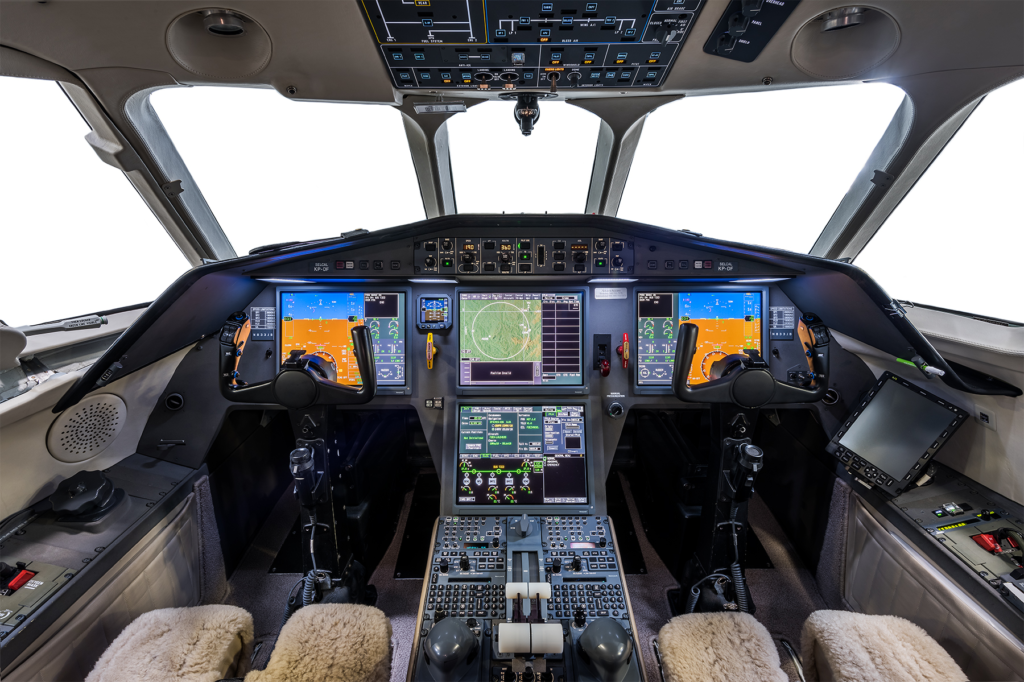
The Falcon 2000 comes equipped from the factory with a sophisticated avionics suite designed to ensure maximum safety, efficiency, and convenience in operation. The primary suite, known as the Honeywell Primus Epic, is an integrated flight management system that includes a wide range of advanced functionalities. Here are the main components and features:
1. Flight Management System (FMS)
The FMS is the heart of the Falcon 2000’s navigation system. It automates many flight tasks, such as navigation and route optimization, allowing for more efficient operation and reducing pilot workload. It includes capabilities like flight planning, fuel management, and automatic performance calculations.
2. Primary Flight Displays (PFDs)
The PFDs are high-resolution LCD monitors that display essential information for pilots, including aircraft attitude, altitude, speed, and heading. These displays are configurable, allowing pilots to customize the information according to their preferences and needs.
3. Multi-Function Displays (MFDs)
The MFDs complement the PFDs by providing an integrated view of various aircraft systems. They can display information such as navigation maps, weather radar, aircraft system status, and more. This versatility allows pilots to quickly access critical information during the flight.
4. Weather Radar
The integrated weather radar system is crucial for safety, enabling pilots to detect and avoid adverse weather conditions. The radar provides a real-time visualization of storm formations and other weather conditions, assisting in decision-making for safer flight routes.
5. Enhanced Vision System (EVS)
Although optional, many Falcon 2000 models come equipped with the EVS, which uses infrared sensors to provide clear vision in low-visibility conditions. This is particularly useful during landings in fog or at airports with limited lighting.
6. Synthetic Vision System (SVS)
The SVS creates a virtual three-dimensional image of the terrain surrounding the aircraft using topographic map data. This enhances pilot situational awareness, especially in mountainous areas or during approaches to unfamiliar airports.
7. Auto-Throttle
The auto-throttle system automates the control of engine power, helping to maintain the desired speed and improving fuel efficiency. It is integrated with the FMS, automatically adjusting power based on calculated performance data.
8. Traffic Collision Avoidance System (TCAS)
The TCAS is a safety system that monitors the presence of other aircraft in the vicinity. It alerts pilots to potential air traffic conflicts and suggests evasive maneuvers to avoid collisions.
9. Flight Data Monitoring (FDM)
The FDM collects and analyzes flight data to enhance safety and operational efficiency. It allows airlines or operators to analyze flight data to identify trends and improve operating procedures.
10. Communication Systems
The Falcon 2000’s communication systems include VHF radios for voice communications and satellite communication systems for global connectivity. This ensures that pilots can maintain contact with air traffic control and company operations regardless of location.
These advanced avionics make the Falcon 2000 a highly safe and efficient aircraft, equipped to handle a wide range of operational conditions.
Comparative Analysis
| Aircraft | Cruise Speed (knots) | Range (nautical miles) | Approximate Price |
|---|---|---|---|
| Falcon 2000 | 482 | 3,350 | $30 million |
| Gulfstream G280 | 482 | 3,600 | $25 million |
| Bombardier Challenger 350 | 470 | 3,200 | $26 million |
Aircraft Interior
The Falcon 2000 boasts a luxurious and comfortable interior, accommodating up to 10 passengers. The cabin can be configured with various layout options, including work, rest, and entertainment areas, providing an unparalleled flight experience.
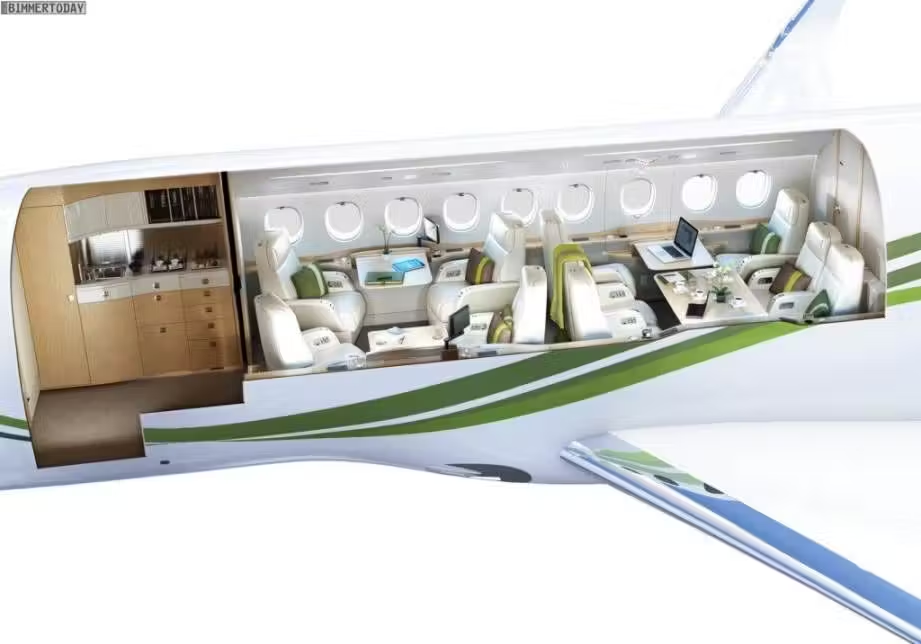
Pilot Opinions
Experienced pilots in the executive aviation market highlight the excellent maneuverability and fuel efficiency of the Falcon 2000. Additionally, the aircraft is praised for the comfort it offers during long flights, ensuring a smooth and pleasant journey for passengers.
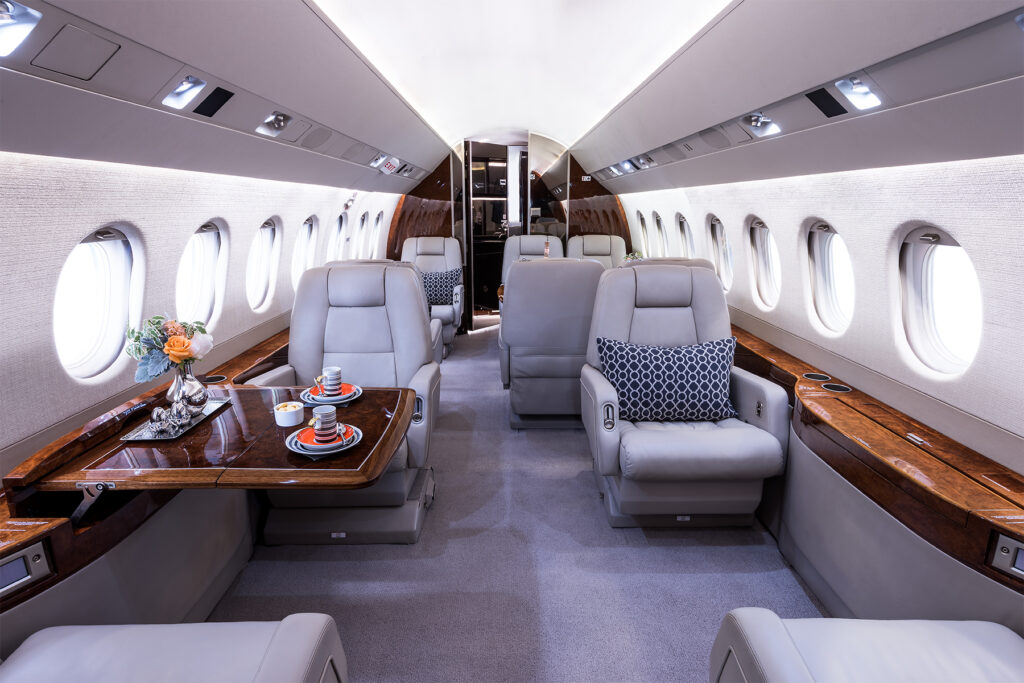
Conclusion
With its blend of efficiency, comfort, and technology, the Falcon 2000 stands out as one of the best options in the executive jet market. If you’re looking for an aircraft that offers performance and luxury, the Falcon 2000 is the ideal choice.
Interested in purchasing a Falcon 2000? Visit our website at goalaircraft.com.br and contact our specialists for more information.

